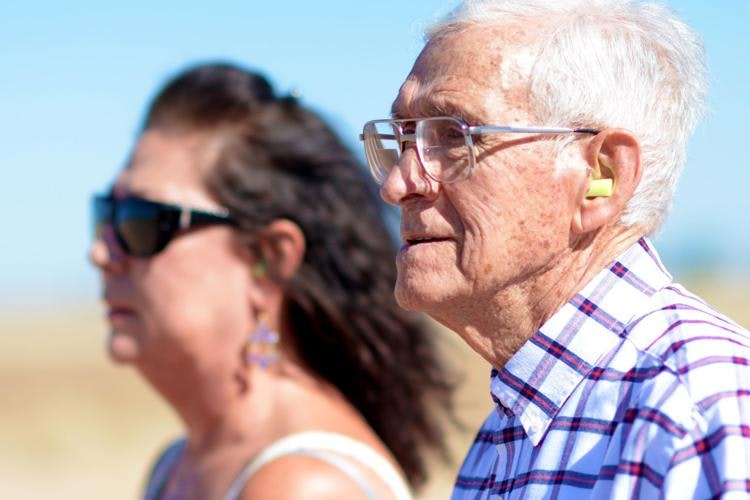Healthcare Articles

Spray repellent, wear long sleeves because virus-carrying mosquitoes are in Tulare Co. By Barbara Anderson August 28, 2018 11:09 AM Tulare County has confirmed the first case of West Nile virus in 2018 in an individual in Porterville.Fresno County has had three cases of West Nile so far this year, according to the California Department of Public Health.West Nile illnesses are causes by mosquito bites, and the same mosquitoes that carry West Nile virus also can carry St. Louis Encephalitis virus.Health officials in Tulare are warning residents to protect themselves from mosquito bites. This year, in addition to West Nile, samples of mosquitoes in Tulare County have shown a higher number of positive test results for St. Louis Encephalitis than in past years.The Tulare Mosquito Abatement District found 19 positive mosquito samples (between 10 and 50 female mosquitoes) capable of transmitting St. Louis Encephalitis virus. Last year, only three samples were positive for the virus. There have been five positive samples for West Nile virus, compared to 46 positive samples last year. The first case of West Nile virus has been confirmed in Porterville for 2018. The Culex Pipeins or more commonly known as a house mosquito carries the West Nile virus. It also can carry St. Louis Encephalitis virus. iFile photo Vida Staff PhotoThe Delta Vector Control District, which serves most of northern Tulare County, has had 77 positive mosquito samples for St. Louis Encephalitis so far this year and 23 positive samples for West Nile. Last year, it had 14 positive samples for St. Louis Encephalitis and 514 for West Nile virus.Most people who are infected have few symptoms from West Nile and St. Louis Encephalitis, but both viruses can cause severe illness in a few people.People should avoid being bitten by mosquitoes by applying insect repellent that contains DEET, picaridin, oil of eucalyptus or IR3535, according to label directions. Wearing long-sleeved shirts and long pants when outside also can protect against mosquito bites. And doors and windows should be tight-fitting. Mosquitoes can breed in small amounts of water, and people are encouraged to check back yards to eliminate sources of standing water.Problems with mosquitoes can be reported to the Delta Vector Control District at 877-732-8606 or online. The Tulare district can be reached at 559-686-6628.
Read more here: https://www.fresnobee.com/news/local/article217448845.html?utm_source=Healthcare+Weekly+Newsletter&utm_campaign=072843ed3f-EMAIL_CAMPAIGN_2018_08_28_10_03&utm_medium=email&utm_term=0_788430eda7-072843ed3f-78679881&mc_cid=072843ed3f&mc_eid=d7eecd3e66#storylink=cpy
Read more here: https://www.fresnobee.com/news/local/article217448845.html?utm_source=Healthcare+Weekly+Newsletter&utm_campaign=072843ed3f-EMAIL_CAMPAIGN_2018_08_28_10_03&utm_medium=email&utm_term=0_788430eda7-072843ed3f-78679881&mc_cid=072843ed3f&mc_eid=d7eecd3e66#storylink=cpy

A recent study shpwed that vegetarian diets are consistently linked with health benefits Healthful Vegetarian Diets Linked with Benefits The latest research presented at the International Congress on Vegetarian Nutrition at Loma Linda University in February 2018 shows that vegan and vegetarian diets are consistently linked with health benefits. Based on multiple cohort studies presented at the conference, including the Adventist Health Study 2, EPIC Oxford study, and the Tzu Chi Health Study 1, these diet patterns were linked with lower levels of blood pressure, "bad" (LDL) cholesterol, fasting blood glucose, and BMI (body mass index); and lower risks for developing cardiovascular disease, certain types of cancers, kidney stones, gout, and cataracts. Interestingly, the latest research on plant-based diets has explored the effects of quality within vegetarian diet patterns -- essentially a highly processed (refined carbohydrates, fried foods, sugary products) diet vs. a pattern based on whole, unprocessed foods (whole grains, pulses, fruits, vegetables, nuts, seeds). As you might expect, the latter diet pattern showed greater benefits. There's never been a better time to consider a plant-based diet, and the more it focuses on whole plant foods, the better. (Environmental Nutrition is the award-winning independent newsletter written by nutrition experts dedicated to providing readers up-to-date, accurate information about health and nutrition in clear, concise English. For more information, visit www.environmentalnutrition.com.)

6 Summer Safety Tips for Senior Citizens Most of us look forward to summer all year long, especially those of us who live in colder climates. If you are planning an outdoor activity that will include senior citizens, such as a trip to the beach, a picnic in the park, or a cookout in your backyard, it’s important to take extra sun safety precautions.Older adults are often more sensitive to heat. Sometimes it is because of a health condition, such as heart disease or chronic obstructive pulmonary disease, and other times it is the result of a medication. Sun sensitivity can be a side effect of some medications commonly prescribed for seniors.Aging brings another safety concern: skin health. As we grow older, our skin becomes thinner and more fragile, causing it to burn more quickly. Sun poisoning is also more common among seniors than younger adults.To help everyone in the family safely enjoy the summer, we pulled together six leading safety tips for you to use and share. 1)Sunscreen This generation of seniors rarely wore sunscreen growing up. That’s why they seldom wear it when they are outdoors or riding in a car. Sunscreen is the best way to protect fragile skin from sunburn and sun poisoning. Encourage the seniors in your life to apply sunscreen with an SPF of 30 to 50 every two to four hours while they are outdoors. 2)Sunglasses Sunglasses play a key role in sun safety and in protecting eyesight. Researchers say that faithfully wearing a quality pair of sunglasses can help protect the eyes from cancerous growths and from cataracts, a condition that occurs more frequently with age. Make sure your senior loved one has sunglasses that block 100% of both UVA and UVB rays. 3)Footwear With aging comes thinner and more fragile skin, including on the tops and bottoms of the feet. While most of us want to wear attractive sandals in warm weather, it’s important for older adults to have quality summer footwear that fits well. They can protect seniors’ feet from cuts, burns, and falls. 4)Hat The face and back of the neck are common places for skin cancer to develop. Sunscreen is a must to protect those areas. It also helps to wear a hat with a brim that is wide enough to shield the face. Another option is a portable beach umbrella. It can offer additional shade to keep an older adult safe in the sun. 5)Bugspray Summer bugs are more than just a pesky problem. Some are linked to health concerns like Lyme disease and West Nile virus. Protect your guests by placing cans of strong bug spray in easy-to-access locations. 6)Hydration Our last tip is to remind everyone attending your outdoor party to stay hydrated. Seniors have an especially tough time in the heat, often because their bodies don’t adjust to changes in temperature and humidity very quickly. This puts them at increased risk for dehydration. Medication side effects and health conditions, such as diabetes and heart disease, further exacerbate the problem. Make sure to set up a hydration station and stock it with ice, water, popsicles, and fruit. We hope these tips keep you and those closest to you safe this summer!
